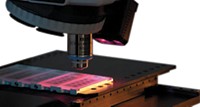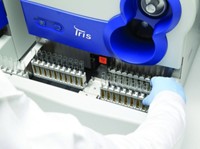Advertisement
Grab your lab coat. Let's get started
Welcome!
Welcome!
Create an account below to get 6 C&EN articles per month, receive newsletters and more - all free.
It seems this is your first time logging in online. Please enter the following information to continue.
As an ACS member you automatically get access to this site. All we need is few more details to create your reading experience.
Not you? Sign in with a different account.
Not you? Sign in with a different account.
ERROR 1
ERROR 1
ERROR 2
ERROR 2
ERROR 2
ERROR 2
ERROR 2
Password and Confirm password must match.
If you have an ACS member number, please enter it here so we can link this account to your membership. (optional)
ERROR 2
ACS values your privacy. By submitting your information, you are gaining access to C&EN and subscribing to our weekly newsletter. We use the information you provide to make your reading experience better, and we will never sell your data to third party members.
Business
Thermo Fisher Bets On Phadia
Diagnostics: Deal gives instrument firm a stake in allergy and autoimmunity testing
by Marc S. Reisch
May 23, 2011
| A version of this story appeared in
Volume 89, Issue 21

Thermo Fisher Scientific has agreed to pay $3.5 billion to buy Phadia, an Uppsala, Sweden-based maker of allergy and autoimmunity diagnostic tests, from the European private equity firm Cinven.
The deal, which Thermo expects to close toward the end of the year, will give the scientific instrument maker a global supplier of blood-test systems with $525 million in annual sales, more than $200 million in operating income, and 1,500 employees.
Thermo CEO Marc N. Casper says the purchase is “a major step forward in our strategy to enhance Thermo’s global presence in specialty diagnostics.” He adds that Phadia “has significant growth opportunities in the large, underpenetrated U.S. market and can leverage our strong presence in emerging geographies.”
Founded in 1967, Phadia has belonged to Cinven since 2007. The sale will bring Cinven a profit of more than $1.4 billion.
Phadia says sales of its allergy tests account for 85% of its revenue and are growing by 9% annually. Such tests, based on blood samples, are an alternative to the widely used but irritating scratch tests in the U.S. Phad ia says it also has a development pipeline of new biomarkers for autoimmunity testing.
Thermo will make use of its existing infrastructure and distribution channels to market Phadia products, Casper told analysts in a conference call after the deal was announced. By 2014, he expects to generate an additional $15 million in operating income from Phadia by leveraging Thermo’s global infrastructure and another $20 million by taking advantage of existing sales channels.
For Thermo, the acquisition will add a fourth leg to a diagnostics business that now includes microbiology, anatomical pathology, and specialty assay segments. Together, they generated sales of $1.4 billion in 2010.
The deal to acquire Phadia wraps up a busy few days for Thermo. On May 13, the company completed the $2.1 billion acquisition of chromatography instrument maker Dionex, and a few days later it bought Sterilin, a maker of single-use products for life sciences customers (see page 22).





Join the conversation
Contact the reporter
Submit a Letter to the Editor for publication
Engage with us on Twitter